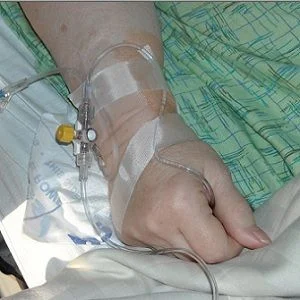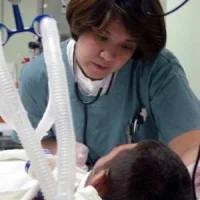Critically ill patients with complex diagnoses generally receive better and less expensive care at long-term acute care hospitals (LTCHs), according to a new study reported in the journal Medical Care. Results showed lower death rates and similar or lower Medicare costs at LTCHs, compared with other care settings, for patients with multiple organ failure and those who spent three or more days in intensive care.
The research was commissioned by the National Association of Long Term Hospitals (NALTH), and is the first peer-reviewed, published study to evaluate costs and outcomes of non-ventilator patients receiving care at an LTCH. LTCHs are specialty hospitals that care for patients with serious medical conditions who need hospital-level treatment for an extended period.
"As our population ages and the incidence of chronic disease increases, critically ill and medically complex patients will represent a growing segment of the Medicare population," says lead author Lane Koenig, PhD, director of Policy and Research for NALTH. "Because care for these patients requires a significant amount of healthcare resources, it's important to identify cost-effective treatment approaches."
The study reviewed 2009-2011 Medicare data. Among non-ventilator patients, researchers identified the five most common major diagnostic categories treated in LTCHs: respiratory, circulatory, digestive, musculoskeletal and connective tissue, and infectious and parasitic diseases and disorders. Among these five categories, researchers identified those patients who had spent three or more days in a standard hospital ICU (prior to transfer to the LTCH) and those with multiple organ failure. Data analysis revealed the following:
Patients with Multiple Organ Failure
Patients Who Spent at Least 3 Days in the ICU
Overall, researchers concluded that LTCH care is the superior treatment option for seven out of 10 high-severity, non-ventilator patient groups reviewed. For two of the patient groups reviewed, LTCHs reduce mortality, but at higher cost. For one group, LTCH care is associated with similar mortality and cost relative to care at other settings.
Cheryl Burzynski, NALTH President, said: "LTCHs must be part of the conversation as payers seek ways to improve outcomes and reduce treatment costs for patients with significant illnesses."
Source: National Association of Long Term Hospitals
Image credit: Pixabay
The research was commissioned by the National Association of Long Term Hospitals (NALTH), and is the first peer-reviewed, published study to evaluate costs and outcomes of non-ventilator patients receiving care at an LTCH. LTCHs are specialty hospitals that care for patients with serious medical conditions who need hospital-level treatment for an extended period.
"As our population ages and the incidence of chronic disease increases, critically ill and medically complex patients will represent a growing segment of the Medicare population," says lead author Lane Koenig, PhD, director of Policy and Research for NALTH. "Because care for these patients requires a significant amount of healthcare resources, it's important to identify cost-effective treatment approaches."
The study reviewed 2009-2011 Medicare data. Among non-ventilator patients, researchers identified the five most common major diagnostic categories treated in LTCHs: respiratory, circulatory, digestive, musculoskeletal and connective tissue, and infectious and parasitic diseases and disorders. Among these five categories, researchers identified those patients who had spent three or more days in a standard hospital ICU (prior to transfer to the LTCH) and those with multiple organ failure. Data analysis revealed the following:
Patients with Multiple Organ Failure
- Lower mortality rates for those who had musculoskeletal and connective tissue, circulatory, and respiratory conditions
- Mortality rate gaps were statistically insignificant for patients with digestive issues and infections and parasitic diseases and disorders
- Lower costs for treatment of circulatory, digestive and musculoskeletal and connective tissue conditions, with savings ranging from $13,806 to $20,809 over an episode of care
- Medicare cost differences were statistically insignificant for those with respiratory and infectious and parasitic conditions
Patients Who Spent at Least 3 Days in the ICU
- Lower mortality rates in all diagnostic categories except digestive disorders (ie, statistically significant difference in mortality)
- Lower costs for those with circulatory, digestive, and musculoskeletal and connective tissue conditions
- However, those with respiratory and infectious and parasitic conditions incurred higher costs
Overall, researchers concluded that LTCH care is the superior treatment option for seven out of 10 high-severity, non-ventilator patient groups reviewed. For two of the patient groups reviewed, LTCHs reduce mortality, but at higher cost. For one group, LTCH care is associated with similar mortality and cost relative to care at other settings.
Cheryl Burzynski, NALTH President, said: "LTCHs must be part of the conversation as payers seek ways to improve outcomes and reduce treatment costs for patients with significant illnesses."
Source: National Association of Long Term Hospitals
Image credit: Pixabay
References:
Koenig L et al. (2015) The Role of Long-term Acute Care Hospitals in Treating the Critically Ill and Medically Complex: An Analysis of Nonventilator Patients. Medical Care, July 2015. doi:
10.1097/MLR.0000000000000382
Latest Articles
healthmanagement, acute care, critically ill, medicare, organ failure, ICU
Critically ill patients with complex diagnoses generally receive better and less expensive care at long-term acute care hospitals (LTCHs), according to a new study reported in the journal Medical Care.










